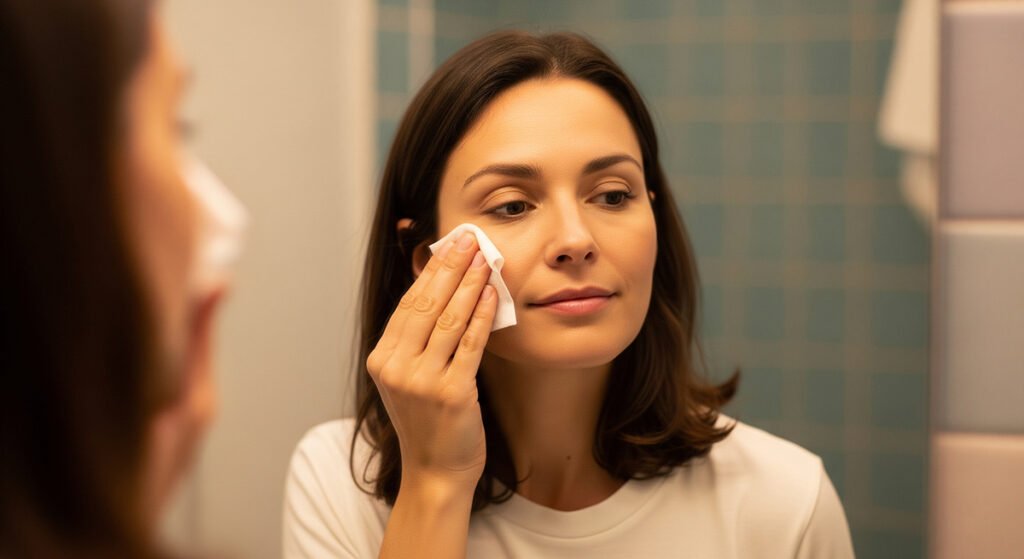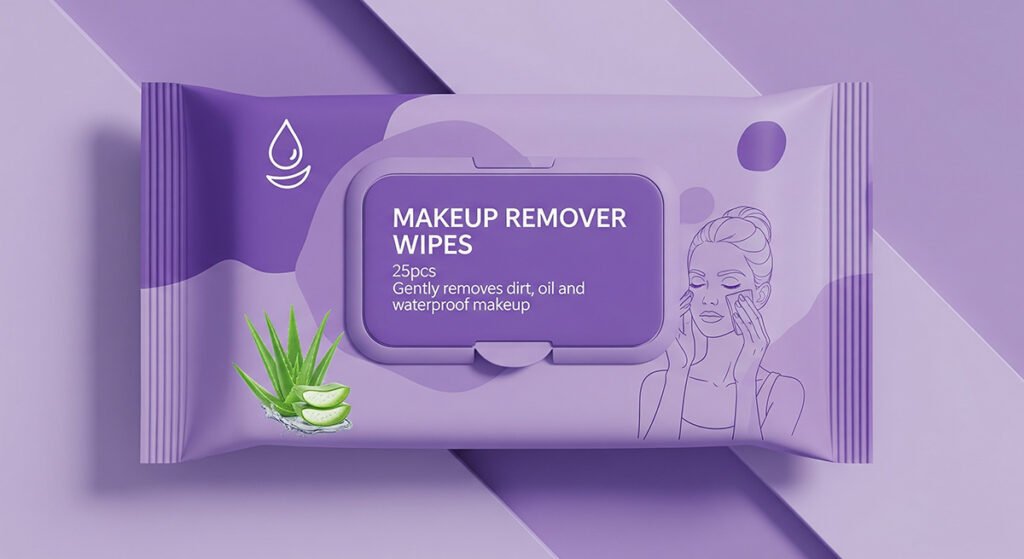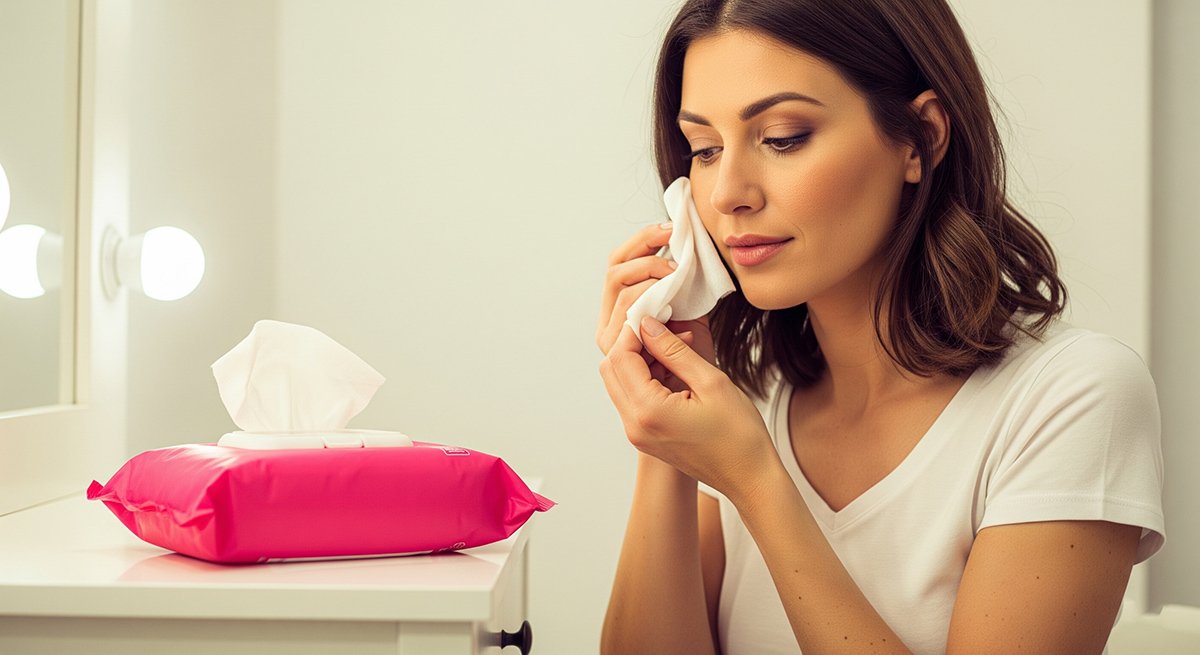In this fast-paced existence, every second counts, and anything that streamlines our routines is welcomed with open arms. Enter the humble makeup wipe – a seemingly innocuous square of fabric, pre-moistened with a cleansing solution, promising to whisk away the day’s grime and glam with a single swipe. From Ankang wipes manufacturer’s perspective, the rise of the makeup wipe has been nothing short of phenomenal. We’ve witnessed their ubiquity firsthand, seeing them transition from a niche beauty product to a household staple. But as experts in the science of cleansing and the intricate relationship between our products and your skin, a crucial question echoes in our labs and across the industry: Do dermatologists truly recommend makeup wipes?
The answer, as with many things in the complex world of skincare, is not a simple yes or no. It’s a nuanced discussion, brimming with caveats and considerations. To truly understand the dermatological perspective, we must first acknowledge the undeniable appeal and convenience that makeup wipes offer. Imagine the exhaustion after a long day, the sheer inertia of wanting to collapse into bed without the arduous ritual of a multi-step cleansing routine. The makeup wipe appears as a beacon of hope, a swift and seemingly effective solution. For travelers, gym-goers, or those simply short on time, they represent an unparalleled ease. We, as manufacturers, recognize this profound need for accessible and efficient cleansing. We’ve dedicated countless hours to perfecting formulas that are gentle yet effective, ensuring our wipes can tackle even stubborn waterproof mascara without excessive tugging or rubbing. Our commitment to innovation in this space stems from a deep understanding of consumer demand for products that fit seamlessly into modern lifestyles.
However, the very convenience that makes makeup wipes so appealing also forms the crux of the dermatological debate. The primary concern often voiced by skin professionals revolves around the concept of a complete cleanse. While makeup wipes are undeniably adept at removing surface-level makeup and some initial impurities, are they truly capable of purging the skin of all traces of makeup, dirt, oil, and environmental pollutants that accumulate throughout the day? This is where the confusion often arises for consumers. We tend to conflate “removing makeup” with “cleansing the skin,” and these are, in fact, two distinct processes. Think of it this way: wiping down a dusty table removes the visible dust, but it doesn’t necessarily disinfect or deeply clean the surface. Similarly, makeup wipes can remove the superficial layers, but they may leave behind a film of residue, microscopic particles, and a surprising amount of trapped impurities. This is not a flaw in the product itself, but rather a limitation in its intended use as a primary cleansing method.

Another significant area of concern for dermatologists is the potential for irritation, particularly for those with sensitive or acne-prone skin. Many makeup wipes, to be effective at breaking down stubborn makeup, contain surfactants, preservatives, fragrances, and sometimes alcohol. While we, as manufacturers, strive to formulate with the mildest and most skin-friendly ingredients, the very act of wiping can cause friction. This mechanical irritation, combined with the chemical components, can disrupt the skin’s natural barrier function. When the skin barrier is compromised, it becomes more susceptible to dryness, redness, itching, and even breakouts. Imagine applying a slight abrasive force to your skin day after day, without truly rinsing away the cleansing agents. It’s a recipe for potential irritation, isn’t it? For individuals prone to conditions like rosacea or eczema, the ingredients and the wiping motion can exacerbate their symptoms, leading to a cycle of discomfort and inflammation. Our research and development teams are continuously working to mitigate these risks, exploring new formulations that minimize potential irritants and maximize gentleness, but the inherent nature of a leave-on cleansing method presents unique challenges.
Furthermore, the environmental impact of makeup wipes is a growing concern for both consumers and professionals. The majority of conventional makeup wipes are made from non-biodegradable synthetic fibers, contributing to landfill waste and microplastic pollution. This ecological footprint is something we, as responsible manufacturers, are acutely aware of and actively addressing. The sudden realization that a product designed for convenience might be contributing to a larger environmental crisis can be quite unsettling for consumers who are increasingly environmentally conscious. We are investing heavily in sustainable alternatives, exploring biodegradable materials and innovative packaging solutions to align with both consumer values and ecological responsibility. It’s a complex challenge, but one we are committed to tackling head-on, recognizing that our responsibility extends beyond just product efficacy.

So, if dermatologists often express reservations about makeup wipes as a standalone cleansing solution, what do they recommend? The overwhelming consensus is that makeup wipes should be viewed as a first step in a more comprehensive cleansing routine, or as a convenient solution for occasional use. They are excellent for breaking down the initial layer of makeup, particularly for heavy or waterproof formulations. Think of them as the initial sweep before the deep clean. Following up with a gentle, water-based cleanser – a foam, gel, or cream cleanser – and thoroughly rinsing with water is crucial to ensure all impurities and residues are removed. This two-step process, often referred to as “double cleansing,” is widely endorsed by dermatologists as the gold standard for achieving truly clean and healthy skin. It ensures that not only is the makeup removed, but the skin is also prepped to absorb subsequent skincare products effectively. This meticulous approach prevents clogged pores, reduces the likelihood of breakouts, and maintains the skin’s delicate balance. From our vantage point, this isn’t a rejection of makeup wipes, but rather a clarification of their optimal role within a well-rounded skincare regimen.
In essence, dermatologists don’t universally “recommend” makeup wipes in the same way they recommend a broad-spectrum sunscreen or a vitamin C serum. Rather, they offer a nuanced perspective: makeup wipes can be a useful tool when used judiciously and as part of a more complete cleansing ritual. They are fantastic for those moments of exhaustion, for quick touch-ups, or for removing the initial layer of grime before a more thorough wash. But relying on them as your sole cleansing method, day in and day out, can lead to a build-up of impurities, potential irritation, and a compromised skin barrier over time.
As a manufacturer, our goal is to provide effective, safe, and convenient products that contribute positively to your skin health. We recognize the vital role that dermatologists play in guiding consumers towards optimal skincare practices. Therefore, we echo their sentiments: use makeup wipes wisely. Understand their limitations and appreciate their strengths. They are a valuable addition to your skincare arsenal when used in conjunction with a comprehensive cleansing routine. The beauty of skincare lies in its adaptability, and makeup wipes, when employed thoughtfully, can certainly play a supportive role in your journey towards radiant and healthy skin. It’s about making informed choices, isn’t it? And understanding that true skin health comes from a consistent, thoughtful approach, not just a quick fix.
Conclusion
The question of whether dermatologists recommend
is not about a categorical endorsement or dismissal, but rather a call for informed and intentional use. From our position as a leading wet wipes manufacturer, we understand the immense value of convenience they offer. However, we also align with the dermatological consensus that makeup wipes are best utilized as a preliminary step in a more thorough cleansing routine, or for occasional on-the-go situations. They are effective at removing surface makeup, but for a truly clean, healthy, and balanced complexion, a subsequent wash with a water-based cleanser is paramount. Prioritizing a complete cleansing ritual, understanding the ingredients, and considering your individual skin needs are crucial for maintaining optimal skin health.
FAQs
- Can I use makeup wipes if I have extremely sensitive skin or eczema?While some makeup wipes are formulated for sensitive skin, it’s generally recommended to proceed with caution. The friction from wiping and the presence of certain ingredients (even mild ones) can still irritate compromised skin barriers.6 Dermatologists often advise opting for a gentle, fragrance-free, rinse-off cleanser for highly sensitive skin to minimize potential irritation. If you must use a wipe, look for “hypoallergenic,” “fragrance-free,” and “alcohol-free” options, and always follow up with a thorough rinse.
- Are there any specific ingredients in makeup wipes that dermatologists advise avoiding?Dermatologists often recommend avoiding makeup wipes containing alcohol (ethanol, isopropyl alcohol) as they can be drying and irritating.7 Strong fragrances, certain essential oils, and harsh surfactants like sodium lauryl sulfate (SLS) can also be problematic for many skin types. When choosing a wipe, look for ingredients like micellar water, gentle emollients, and soothing extracts, and always check the ingredient list for potential irritants specific to your skin.
- How do makeup wipes compare to micellar water for cleansing?Micellar water, when applied with a cotton pad, is often considered a gentler alternative to traditional makeup wipes, particularly because it doesn’t always require rinsing.8 Micelles are tiny oil molecules suspended in soft water that attract dirt and oil without harsh rubbing.9 However, both still primarily address surface impurities. For a truly deep clean, dermatologists typically recommend following up micellar water with a traditional cleanser, especially if wearing heavy makeup or sunscreen.10
- Is it true that makeup wipes can leave a residue that clogs pores?Yes, this is a common concern. While makeup wipes remove the visible layer of makeup and dirt, they can leave behind a film of cleansing agents, dissolved makeup, and other impurities.11 If not rinsed off, this residue can sit on the skin, potentially leading to clogged pores, breakouts, and an imbalance in the skin’s natural microbiome. This is why dermatologists emphasize the importance of a follow-up rinse-off cleanser.
- What’s the best way to use a makeup wipe to minimize potential harm to my skin?To minimize irritation, use a makeup wipe gently without excessive rubbing or tugging, especially around the delicate eye area. Opt for a wipe that feels adequately moist, so it glides easily. Use one wipe for each section of your face if necessary to avoid spreading dirt. Most importantly, always follow up with a thorough cleanse using a gentle, rinse-off facial cleanser and lukewarm water to remove any lingering residue and truly purify your skin. Consider makeup wipes an initial step, not the final one.





